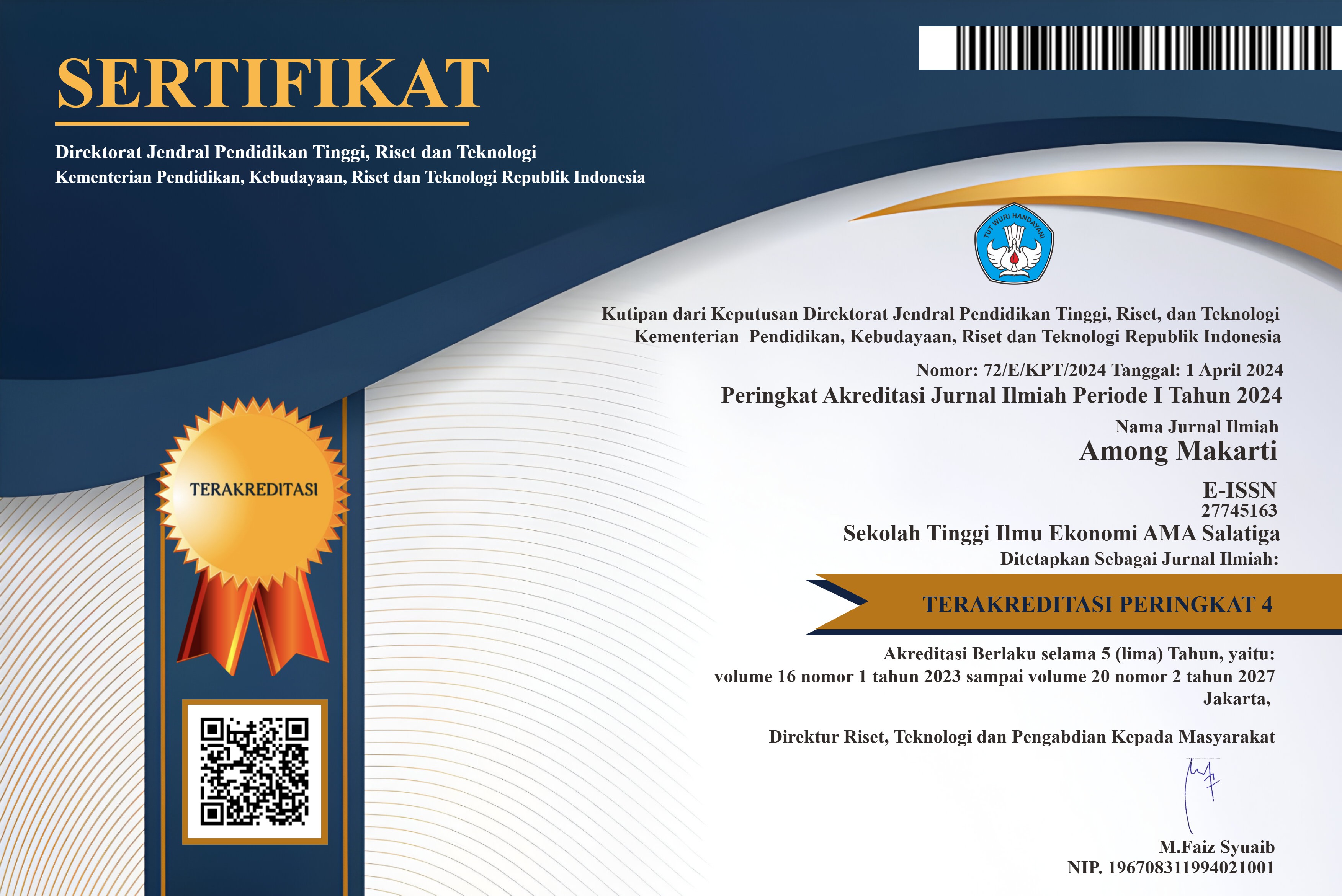STRATEGI MEMBANGUN KETAHANAN PSIKOLOGIS KELUARGA DITENGAH PANDEMI COVID – 19 MELALUI PENGUATAN SPIRITUAL LEADERSHIP DAN FAMILY ATTACHMENT : STUDI KASUS PADA KELUARGA DI KOTA SALATIGA
Abstrak
Penelitian ini merupakan eksperimen untuk mengembangkan model ketahanan psikologis keluarga melalui peran kepemimpinan spiritual dan keterikatan keluarga. Oleh karena itu responden yang digunakan dalam penelitian ini adalah anggota keluarga yang berada di Salatiga. Data dikumpulkan dari 171 anggota keluarga menggunakan kuesioner. Alat analisis yang digunakan adalah path analysis, dan hasil penelitian ini mengungkapkan bahwa spiritual leadership dan family attachment memiliki hubungan yang signifikan dan positif terhadap resiliensi psikologis. Kedua, family well-being sebagai konstruk mediasi, sepenuhnya memediasi hubungan antara kepemimpinan spiritual dan keterikatan keluarga terhadap ketahanan psikologis keluarga. Akhirnya penelitian ini menawarkan bukti empiris tentang bagaimana mengembangkan ketahanan psikologis keluarga di Salatiga. Fakta lain yang perlu digarisbawahi dari penelitian ini adalah ketahanan psikologis merupakan salah satu kunci untuk menciptakan ketahanan di masa pandemi ini.
Kata Kunci
Teks Lengkap:
PDFReferensi
Agung, I. M. (2020). Memahami Pandemi Covid-19 Dalam Perspektif Psikologi Sosial. Psikobuletin:Buletin Ilmiah Psikologi.
Amir, M. T., & Standen, P. (2019). Growth-focused resilience: development and validation of a new scale. Management Research Review. https://doi.org/10.1108/MRR-04-2018-0151
Baker, M., Gruber, J., & Milligan, K. (2008). Universal child care, matemal labor supply, and family well-being. Journal of Political Economy. https://doi.org/10.1086/591908
Campbell-Sills, L., Cohan, S. L., & Stein, M. B. (2006). Relationship of resilience to personality, coping, and psychiatric symptoms in young adults. Behaviour Research and Therapy. https://doi.org/10.1016/j.brat.2005.05.001
Chin, W. W., & Dibbern, J. (2010). An Introduction to a Permutation Based Procedure for Multi-Group PLS Analysis: Results of Tests of Differences on Simulated Data and a Cross Cultural Analysis of the Sourcing of Information System Services Between Germany and the USA. In Handbook of Partial Least Squares. https://doi.org/10.1007/978-3-540-32827-8_8
Connor, K. M., & Davidson, J. R. T. (2003). Development of a new Resilience scale: The Connor-Davidson Resilience scale (CD-RISC). Depression and Anxiety. https://doi.org/10.1002/da.10113
Cuvelier, L., & Falzon, P. (2016). Resilience As Resource-based Design Of Anticipated Situations. In Proceedings of the fourth Resilience Engineering Symposium. https://doi.org/10.4000/books.pressesmines.982
Dewi, D. S. E., & Hamzah, H. B. (2019). The Relationship between Spirituality, Quality of Life, and Resilience. https://doi.org/10.2991/iccd-19.2019.39
Ekşi, H., & Kardaş, S. (2017). Spiritual Well-Being: Scale Development and Validation. Spiritual Psychology and Counseling. https://doi.org/10.12738/spc.2017.1.0022
Fahrudin, A., Jakarta, U. M., Susilowati, E., Kesejahteraan, P., Bandung, S., Erlangga, H., Pasundan, U., Wardani, L., & Buana, U. M. (2020). Peranan keluarga dalam menghadapi pandemi covid-19 di indonesia. Covid-19: Pandemi Dalam Banyak Wajah, Agustus, 111–117.
Fry, L. W. (2003). Toward a theory of spiritual leadership. Leadership Quarterly. https://doi.org/10.1016/j.leaqua.2003.09.001
Goldberg, S. (2018). Origins of attachment theory. In Attachment and development. https://doi.org/10.4324/9780203783832-1
Hair, J. F., Black, W. C., Babin, B. J., & Anderson, R. E. (2017). Multivariate Data Analysis: Seventh Edition. In Prentice Hall.
Iskandarsyah, A., & Yudiana, W. (2020). Informasi COVID-19, Perilaku Sehat Dan Kondisi Psikologis Di Indonesia.
Lee, J. H., Nam, S. K., Kim, A. R., Kim, B., Lee, M. Y., & Lee, S. M. (2013). Resilience: A meta-analytic approach. Journal of Counseling and Development. https://doi.org/10.1002/j.1556-6676.2013.00095.x
Li, S., Wang, Y., Xue, J., Zhao, N., & Zhu, T. (2020). The impact of covid-19 epidemic declaration on psychological consequences: A study on active weibo users. International Journal of Environmental Research and Public Health. https://doi.org/10.3390/ijerph17062032
Luthar, S. S. (2006). Resilience in Development: A Synthesis of Research across Five Decades. In Developmental Psychopathology: Second Edition. https://doi.org/10.1002/9780470939406.ch20
Masten, A. S., & Obradović, J. (2006). Competence and resilience in development. Annals of the New York Academy of Sciences. https://doi.org/10.1196/annals.1376.003
Mawarpury, M., & Mirza, M. (2017). RESILIENSI DALAM KELUARGA: PERSPEKTIF PSIKOLOGI. Psikoislamedia : Jurnal Psikologi. https://doi.org/10.22373/psikoislamedia.v2i1.1829
McAdam, J. (2013). Coping and adaptation: A narrative analysis of children and youth from zones of conflict in Africa. In Handbook of Resilience in Children of War. https://doi.org/10.1007/978-1-4614-6375-7_12
Mujiyanto, F. I. (2016). Family well-being pada keluarga yang ditinggal berurbanisasi di desa Kalikabong Kecamatan Kalimanah Kabupaten Purbalingga. In Journal of Chemical Information and Modeling. Universitas Muhammadiyah Purwokerto.
Näswall, K., Malinen, S., Kuntz, J., & Hodliffe, M. (2019). Employee resilience: development and validation of a measure. Journal of Managerial Psychology. https://doi.org/10.1108/JMP-02-2018-0102
Nisrina, H. E., Faruq, M. I., Masruroh, R., Nurlatifah, S. S., & Nisa, S. K. (2020). Konstruksi Alat Ukur Kepemimpinan Spiritual dalam Keluarga. Jurnal Psikologi Islam Dan Budaya. https://doi.org/10.15575/jpib.v3i1.6526
Palazzeschi, L., Bucci, O., & Di Fabio, A. (2018). Re-thinking innovation in organizations in the industry 4.0 scenario: New challenges in a primary prevention perspective. Frontiers in Psychology. https://doi.org/10.3389/fpsyg.2018.00030
Rajkumar, R. P. (2020). Attachment theory and psychological responses to the covid-19 pandemic: A narrative review. In Psychiatria Danubina. https://doi.org/10.24869/PSYD.2020.256
Thomas, P. A., Liu, H., & Umberson, D. (2017). Family Relationships and Well-Being. Innovation in Aging. https://doi.org/10.1093/geroni/igx025
Vrtička, P., & Vuilleumier, P. (2012). Neuroscience of human social interactions and adult attachment style. In Frontiers in Human Neuroscience. https://doi.org/10.3389/fnhum.2012.00212
Walsh, F. (2016). Family resilience: a developmental systems framework. European Journal of Developmental Psychology. https://doi.org/10.1080/17405629.2016.1154035
Wang, C., Pan, R., Wan, X., Tan, Y., Xu, L., Ho, C. S., & Ho, R. C. (2020). Immediate psychological responses and associated factors during the initial stage of the 2019 coronavirus disease (COVID-19) epidemic among the general population in China. International Journal of Environmental Research and Public Health. https://doi.org/10.3390/ijerph17051729
White, B., Driver, S., & Warren, A. M. (2010). Resilience and Indicators of Adjustment During Rehabilitation From a Spinal Cord Injury. Rehabilitation Psychology. https://doi.org/10.1037/a0018451
DOI: http://dx.doi.org/10.52353/ama.v15i2.329
Refbacks
- Saat ini tidak ada refbacks.
Copyright (c) 2022 Yanuar Surya Putra, Fitri Wulandini

This work is licensed under a Creative Commons Attribution-ShareAlike 4.0 International License.
AMONG MAKARTI : JURNAL EKONOMI DAN BISNIS
SEKOLAH TINGGI ILMU EKONOMI AMA SALATIGA
 Jl. Diponegoro No.39, Salatiga, Kec. Sidorejo, Kota Salatiga, Jawa Tengah
Jl. Diponegoro No.39, Salatiga, Kec. Sidorejo, Kota Salatiga, Jawa Tengah
TERINDEKS :

This work is licensed under a Creative Commons Attribution-ShareAlike 4.0 International License.



























